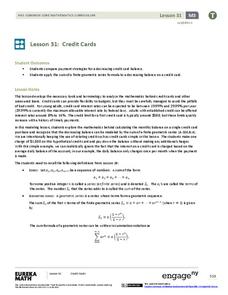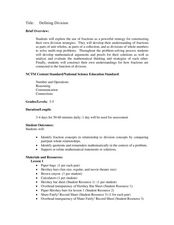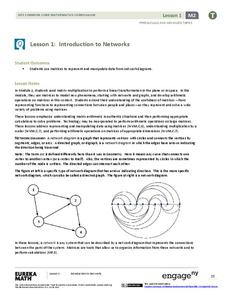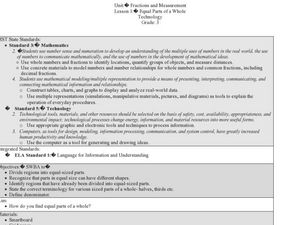EngageNY
Multiplying and Dividing Rational Expressions
Five out of four people have trouble with fractions! After comparing simplifying fractions to simplifying rational expressions, pupils use the same principles to multiply and divide rational expressions.
EngageNY
Credit Cards
Teach adolescents to use credit responsibly. The 32nd installment of a 35-part module covers how to calculate credit card payments using a geometric series. It teaches terminology and concepts necessary to understand credit card debt.
EngageNY
Buying a House
There's no place like home. Future home owners investigate the cost of buying a house in the 33rd installment of a 35-part module. They come to realize that the calculations are simply a variation of previous formulas involving car loans...
EngageNY
Equations for Lines Using Normal Segments
Describing a line using an algebraic equation is an essential skill in mathematics. The previous instructional activity in the series challenged learners to determine if segments are perpendicular with a formula. Now they use the...
EngageNY
Solving Exponential Equations
Use the resource to teach methods for solving exponential equations. Scholars solve exponential equations using logarithms in the twenty-fifth installment of a 35-part module. Equations of the form ab^(ct) = d and f(x) = g(x) are...
Curriculum
Expository Writing
The beauty of the way this expository writing resource is structured is that the units can be presented as a complete writing workshop or sequenced throughout a course of study
Curated OER
Mining Shapes
In this 2-D shapes lesson, kindergarteners review plane shapes attributes. They engage in a shape hunt in the classroom and create art using plane shapes. A good, hands-on lesson!
Curated OER
ESOL Competencies: Consumer Education
It is so important for your adult English language learners to know how to maintain their household and find the appropriate service providers when needed. Instead of using a phone book (which is rare these days), reference the internet...
Curated OER
Defining Division
Upper graders explore division through fair-shares. They will review fair shares and fractions as a segway into division. They start by playing "Share Fairly" game and create mathematical arguments for solving problems. Manipulatives and...
National Gallery of Canada
My World
Art can tell viewers about an artist's personality and background. Have your learners look at Inuit art and consider subject matter and how it relates to the artist and his or her world. The related art project requires pupils to create...
National Gallery of Canada
Being a Photojournalist
Tell a story with images. Learners view several photojournalistic photos before agreeing on a message to convey with their own photo stories. In small groups, they take and select photos to include in their final project.
EngageNY
Interpreting Correlation
Is 0.56 stronger than -0.78? Interpret the correlation coefficient as the strength and direction of a linear relationship between two variables. An algebra instructional activity introduces the correlation coefficient by estimating...
EngageNY
Multiplying Polynomials
There's only one way to multiply, right? Not when it comes to polynomials. Reach each individual by incorporating various representations to multiplying polynomials. This lesson approaches multiplying polynomials from all angles. Build...
EngageNY
The Graph of the Natural Logarithm Function
If two is company and three's a crowd, then what's e? Scholars observe how changes in the base affect the graph of a logarithmic function. They then graph the natural logarithm function and learn that all logarithmic functions can be...
Scholastic
Discussion and Dissection of an Owl Pellet
Young scientists get the chance to dissect pellets "owl" by themselves to determine the owls environment and nourishment. This is the third part of a three-part series.
EngageNY
Advanced Factoring Strategies for Quadratic Expressions (part 1)
Factoring doesn't have to be intimidating. Build on prior knowledge of multiplying binomials and factoring simple trinomials to teach advanced factoring of quadratic expressions with a lesson that uses various methods of exploring the...
EngageNY
Estimating Digits in a Quotient
Boiling down any division problem to a one-digit divisor problem sure makes estimation easy. The lesson shows how to estimate division problems by using place value understanding and basic arithmetic facts to simplify the division. Some...
Curated OER
Conditional Probability and Probability of Simultaneous Events
Your statisticians examine the characteristics of conditional probability and the probability of simultaneous independent events. They perform computer activities to find probabilities for simple compound events. They examine the...
EngageNY
Introduction to Networks
Watch as matrices break networks down into rows and columns! Individuals learn how a network can be represented as a matrix. They also identify the notation of matrices.
Curated OER
My Personal Wellness
Merge technology and wellness. Class members complete inquiry-based research on a personal wellness issue and create an annotated bibliography, uploading their completed work to their personal wellness websites. Prior to beginning, your...
National Gallery of Canada
Mastering One-Point Perspective
Cover one-point perspective through observation and practice. Class members examine several works of art that use one-point perspective, look at magazine images to find the vanishing points and horizon lines, and draw their own city...
Civil War Trust
Map the Civil War
Mapmaking was a very important element in successfully planning attacks on enemies during the Civil War. Guide pupils through the process of pacing to find the average length of their steps, measure the distance between one object...
Curated OER
Fractions and Measurement
Using a Smart Board, or a plain ol' white board or chalkboard, the teacher pulls up a grid and demonstrates how squares and rectangles can be divided up into equal parts. The class will get their own graph paper to draw shapes and divide...
Curated OER
Character Traits - Who are We?
Sixth graders examine character traits. In this character education lesson, 6th graders set goals to strengthen particular personal character traits. Students watch their instructor model the character trait journaling strategy prior to...























